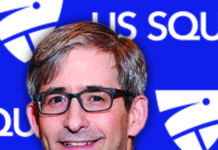By Bill Buckingham
When attending the Tournament of Champions, held annually at Grand Central Terminal in New York City, it’s very easy to fall prey to the illusion that squash has gone mainstream and finally everyone has caught on to what we have known all along: that there is no greater game, and there are no greater athletes, than the professionals who inhabit the top echelons of the sport. You even feel a small sense of superiority, that “I got there first” and “I’m part of this and you’re not” mentality as you observe the thousands of neophytes who stop and gawk at the spectacle in Vanderbilt Hall during the tournament. My least favorite day of the year is the Monday after the TOC ends, when I walk through Grand Central and come to the painful realization that the “one week when squash matters” is over, and I have to endure 51 weeks of explaining what squash is whenever asked what I do for a living. We often joke in the office, only half kidding, that the best investment in growing awareness for the sport would be to keep the glass court in Grand Central year round.
This year, due to compelling events prior to, and after, the TOC letdown as the court was packed up was not as severe. It all began on the Wednesday before the TOC started, when Yale university defeated Trinity College to snap Trinity’s historic 13 year, 252 dual match winning streak. Despite chatter that ‘the streak’ was in jeopardy, it was still a stunning upset that set off a torrent of positive publicity that squash had not seen in decades. There were stories in almost every major newspaper, including spots on ESPN and a lengthy article on the front page of the New York Times sports section. I was receiving dozens of text messages and emails about the match from friends around the country who have no relationship with the sport whatsoever except for knowing me. It was January 19th, a full two days before the TOC fully kicked off, and already “squash mattered!”
The Tournament of Champions, as usual, lived up to its billing, with huge crowds, great matches and an atmosphere that is unparalleled in our sport. With the buzz of the Yale-Trinity match still palpable, it was easier than ever to get sucked in to the illusion that squash had exploded. After Nick Matthew’s tight drive on match ball eluded James Willstrop, giving Nick his first TOC title, I didn’t even have that first dreaded hint of the “it’s over” feeling that I typically get on the subway home after the finals. That spirit was buoyed on Saturday when I opened up the Times and saw a lengthy feature written by celebrity chef and former Yale squash player Ming Tsai, extolling the virtues of the sport. What was going on here? It was the weekend after and “squash still mattered?”
I think about that ten days in January often, but instead of looking back wistfully, we focus on how to make those ten days turn into months, an actual full season of “mattering.” These past few weeks, squash was back in the mainstream media, first with a story about the Cardinals World Series MVP David Freese and teammate Matt Holliday using squash as their primary off season training vehicle, followed by Princeton university beating Trinity in a thrilling final, denying the bantams their 14th straight Men’s Collegiate Team Championship title. There were so many fans at the match, they stopped letting people into the squash center and had them watch from a Jumbotron set up on the indoor track upstairs. Think about that for a moment—fans were being denied entry because a squash match was at capacity.
Of course, we know exactly what fans watching at the TOC know, and what the current World Series MVP knows, and what fans watching college squash on a Jumbotron set up on a indoor track know. We know that squash does matter, and making it matter to more people, more often, is central to our mission at U.S. SQUASH.



